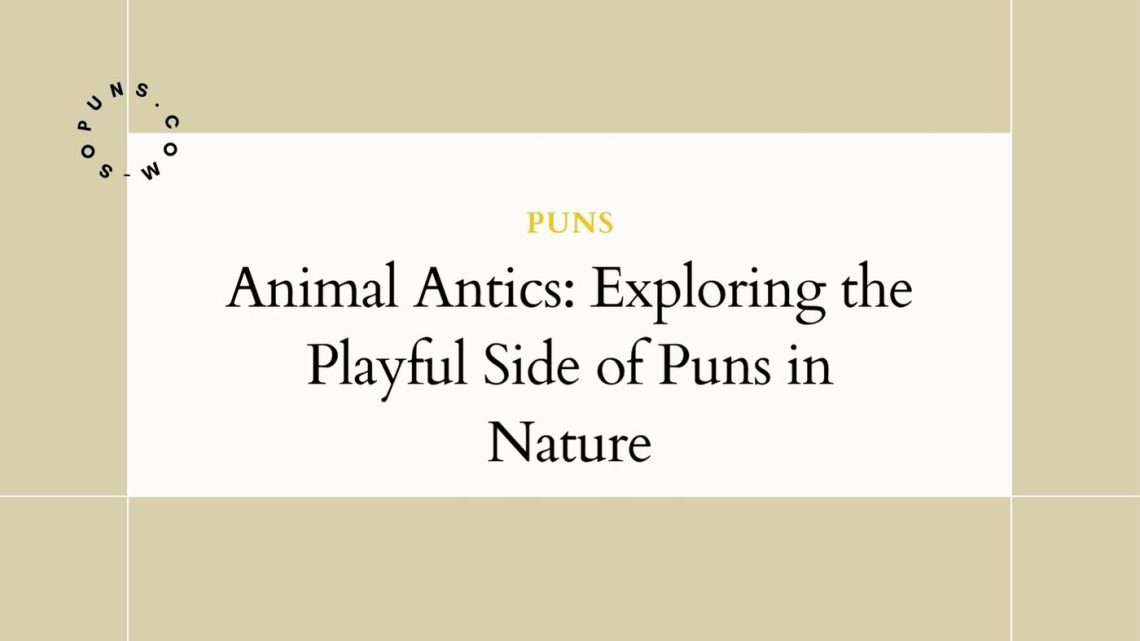For centuries, humans have used animals as sources of inspiration and humor. From pet names to cartoons, our furry and feathered friends spark our punny sides. So let’s dive into the wilderness of animal wordplay!
A Menagerie of Punny Pet Names
Naming pets offers the purr-fect opportunity for puns. Take “Doberman Pincher” for a nippy guard dog or “Pointer Setter” for a hunting hound. Iguanas called “Godzilla” or “Gamera” nod to their reptilian appearance. With cats, every name from “Meow-ssa” to “Clawdia” works. You just can’t go wrong with a pet pun!
My friend adopted a three-legged dog and gave him the punny name “Yardstick.” He jokes that Yardstick is great at measuring the yard in “three feet increments.” Sure, the humor is a bit crippled, but I can’t help but laugh!
Another friend acquired a snake and struggled with names. I suggested “Sir Hiss” or “Slytherin” given the serpent’s sneaky tendencies. She ended up choosing “Noodles,” which I found hysterical. Leave it to pets to slither into our hearts and funny bones!
Punny Animal Stars of Cartoons
From Mickey Mouse to Bugs Bunny, cartoon animals crack us up with their antics. Animators intentionally gave these characters punny names that match their species’ traits.
Take Daffy Duck – his wacky, erratic nature echoes the meaning of “daffy” as silly or crazy. Scooby-Doo’s name derives from “scooby,” 60s slang for a dog. Garfield the cat’s fondness for lasagna aligns with his namesake – James Garfield, the 20th president famous for loving pasta.
Beyond names, cartoon animals engage in humorous verbal and physical wordplay. Scooby and Shaggy make endless sandwich puns, like “thanks for the sub-marine!” In Looney Tunes, Elmer Fudd hunts that “wascally wabbit” Bugs Bunny, who always evades Elmer’s “hare-brained” schemes.
These animal puns and jokes add to the endearing wackiness that makes cartoon characters beloved by generations. As long as animators keep crafting clever animal wordplay, I’ll be a looney (tuned) laughing fan!
Punning with Animal Traits and Behaviors
The unique traits of animals offer a jungle of possibilities for puns. Take the chicken who always exercises – you could call her the “fitness clucker.” Or say a dog accidentally sat on a TV remote – he made a “channel changer blunder.” I know, these are a little cheesy, but you’ll soon be migrating to more creative animal pun pastures!
Certain beasts like plankton, wolves, and cattle work for puns about teamwork and relationships. A supportive friend is a “plankton me.” Coworkers who cooperate are a “herd at work.” And wolf pack members demonstrate “howling team spirit.”
You can also pun on animal behaviors. Comment on a messy eater “wolfing down” food or a jumpy person “leaping to conclusions.” Describe messy hair as a “bird’s nest.” When someone copies you, they “parrot” your words. See, punning with animal traits can be easy as duck soup!
Idioms Take Flight from Animal Wordplay
Animal idioms permeate everyday speech, laying the groundwork for puns. If you are “eager beaver” excited about something, that matches an eager beaver’s enthusiastic dam-building. Feeling sick as a dog? That equates feeling ill to a dog’s lazy, weak behavior when unwell.
Many idioms derive from old fables and phrases. “Curiosity killed the cat” warns that risky inquiry leads to trouble, as the cat’s curiosity caused its demise in some tales. “Let the cat out of the bag” means revealing secrets, based on duplicitous 15th century English peddlers substituting cats for valuable piglets in bags.
You can pun on these idioms’ literal and figurative meanings. Grab dinner with a vegetarian friend? Joking “curiosity will fill the cat, not kill it” pokes fun at their plant-based curiosity. Brag about adopting a rescue cat? Say you’re “letting the cat out of the shelter” by freeing it from the bag-like enclosure. See how idioms can spur creative wordplay?
Conservation Campaigns Employ Punny Animal Messaging
Humor helps spread awareness, making animal puns effective for conservation messaging. Slogans like “don’t fur-get to scoop the poop” remind owners to clean up after pets. Signs saying “no fowl, no swine, let’s keep our beaches fine” request people avoid littering beaches with food scraps.
Puns attract attention for fundraising too. The World Wildlife Fund encourages “panda-monium” and “pandamonium” to support protecting panda habitats. Puns show that protecting polar bear habitats from climate change impacts is a “grizzly” situation needing urgent “paws” for action.
Playful wording makes serious topics more palatable. Plus, punny animal messaging shows that conservationists have a heartwarming sense of humor as big as an elephant’s!
Riddle Me This: Punny Jokes for All Ages

Question: What do you call a sleeping bull? Answer: A bulldozer! Animal jokes and riddles allow all ages to enjoy puns. More appear daily, like this play on “buffalo” and “bulldozer”:
- How does a squirrel get around? With tree-mendous skill!
- Why don’t oysters share their pearls? Because they’re shellfish!
- What do you get from pampered cows? Spoiled milk!
Adults appreciate that chicken crossing the road jokes never get old:
- Why did the chicken cross the playground? To get to the other slide!
- Why did the dinosaur cross the road? Because chickens didn’t exist yet!
Simple riddles help kids learn puns. What has four wheels and flies? A garbage truck! What do you call bears with no ears? B! See, animal puns offer fun for all ages.
The Cultural Significance of Punny Animals
Across cultures, animal puns and symbols permeate mythologies and traditions. Ancient Egyptian hieroglyphs included visual puns, like an owl meaning “m” and an eagle meaning “A”. Many Native American tribes used animals clan symbols with layered meanings.
In Chinese astrology, animal signs represent personality traits, inspiring playful nicknames. Pigs symbolize determination and sincerity, earning them nicknames like “Mr. Piggy-Wiggy-Hog-Head.” Roosters’ pride and zeal inspires “Sir Clucks-a-Lot.”
Literary puns include the “Jabberwocky” poem featuring the “vorpal blade” for slaying a mythical beast. Even businesses pun with animals, like owl imagery symbolizing wisdom for universities and graduations.
Across cultures, animal motifs recur in puns and wordplay, highlighting our long-held appreciation for their whimsy and wit!
Well, that concludes our safari through the wild world of animal humor! From pet names to conservation campaigns, creatures offer a bounty of pun potential. A pun’s enjoyment often correlates with the silliness of its concept – and animals never fail to delight. Keep celebrating our furry, feathered, and scaly friends with playful puns. Just be careful not to badger or goat your pals with too many groaners!






No Comments